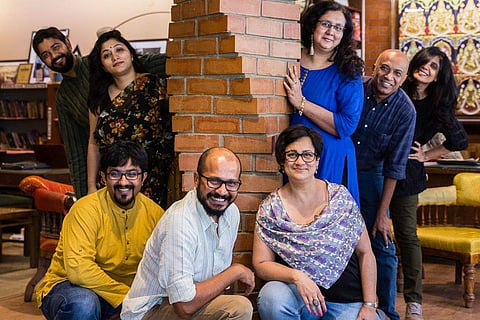
- LIFESTYLE
- FASHION
- FOOD
- ENTERTAINMENT
- EVENTS
- CULTURE
- VIDEOS
- WEB STORIES
- GALLERIES
- GADGETS
- CAR & BIKE
- SOCIETY
- TRAVEL
- NORTH EAST
- INDULGE CONNECT

The fleeting clouds passing by all over the azure sky every morning, after months of gloomy showers in the city, have been turning even the prosaic ones amongst us into sonneteers. Taking cues, Bengaluru Poetry Festival is back with its seventh edition this weekend. Eminent poets of all ages — such as Anuradha Singh, Kinshuk Gupta, Megha Rao, Urooj, Yogesh Maitreya and Zilka Joseph — will grace the festival with debates and discussions on myriad topics from dalit poetry to the art of criticism. But what will set this year’s chapter apart seems to be its focus on having sessions on poetry in a diverse set of languages, including the ones that are not particularly popular in India. To know more, we speak to festival director Shinie Antony along with six other speakers at the festival to give you a sneak peek of what you might expect at their sessions.
What can we expect from your session?
Me and three of my colleagues — Vinod Das, Neelesh Raghwanshi and Lovely Goswami — are coming together to read our poems and bring forth a narrative about the issues in society today at large.
Why do you think the representation of Hindi as a language is significant in poetry festivals such as this?
Although Hindi is widely spoken, layman participation in the contemporary literary tradition remains very low. This stands for all languages in India — if they cease to be represented in poetry, they cease to be represented in their most beautiful form. While the struggle against any form of marginalisation in society cuts across cultures, the stories we tell about them cut across the barriers of language only if all languages are represented.
Tell us about your session at the festival?
We’ll talk about the aesthetics of poetry critiquing — its pleasures and dangers. We’re also going to mull over the current trends — the saleability versus popularity of poetry, the outpouring of small poetry presses and literary journals trying to keep the form alive.
What do you think about poetry criticism in India?
These days every poet is a reviewer too — or at least tends to be. But sometimes it also leads to ‘you-scratch-my-back-I-scratch-your-back’ kind of reviews. This results in the creation of an echo chamber, of which only a handful are a part.
Can you let us in on your session at the festival?
Our session is titled Poems on Your Timeline. It’s still interesting to understand how young poets find their audience through digital platforms. We’ll mostly be talking about our individual journeys as poets who started writing on social media and then broke into traditional publishing.
What are your upcoming projects?
I am working on a one-hour one-woman show and a novel — both linked. I am particularly excited about the novel because it’s experimental in a thematic as well as stylistic way. I’ve always loved intersections when it comes to narration.
How did you curate the speakers and sessions this year?
At least nine months go into discussions about the poets and their work and about our workshops, which are lovingly put together by Amruta Dongray. The workshops are a big highlight, bringing together the poets and the readers in creative electric fields.
What was the reason behind including sessions in languages that are not popular in this part of India?
Bengaluru has always been a good host. So, weaving in other languages is welcomed by the audience. And they incidentally are a multi-tongued entity, eager to soak in unique cultural experiences.
Let us in on your session at the festival?
The panel I will be a part of is called Poems in Progress, which will explore the varied experiences of emerging poets like myself. We’ll read our work and discuss the ways in which we seek an audience for our poetry.
Why did you choose poetry as a medium of self-expression?
I would not say I chose poetry. I began writing poems when I was nine years old, simply because poems seemed to have a rhythm to them or perhaps because the lines could be of any length — there were no rules, per se. Although my understanding of the form has shifted over time, poems have been that constant, tender window in my life, letting light in and letting me look out.
What is your session going to be about?
My session is about dalit poetry in India and how vital it has been in the domain of imagination of a democratic nation but about which we seem to have a narrow understanding. We’ll also intend to break our notion of what poetry could be and should be.
What do you think about dalit poetry in India in recent times?
If poetry in India is not dalit poetry, then it is poetry of a few. Dalit poetry has changed the way we feel emotionally in a divisive society. But in recent times, it is witnessing stagnancy despite the fact that the resources that materialise it, are increasing.
What is your session going to be about?
My contribution to this panel will be about resistance to patriarchy, personal and family history and violence against women. I will read poems mostly from my books Sharp Blue Search of Flame and Sparrows and Dust. If there is time, I would also love to read one of my newer poems.
Who are some of the feminist authors of our times that you follow?
Some of the poets whom I admire are Diane Seuss, Eunice de Souza, Joy Harjo, Kamala Das, Lucille Clifton and Tishani Doshi.
Entry free. August 5-6, 10 am onwards. At Grand Mercure Bengaluru at Gopalan Mall, Old Madras Road.
Email: prattusa@newindianexpress.com
Twitter: @MallikPrattusa